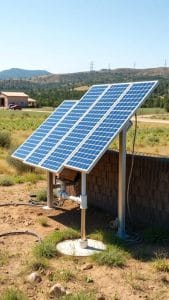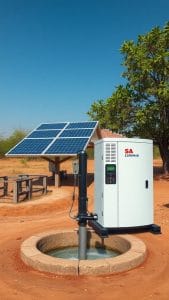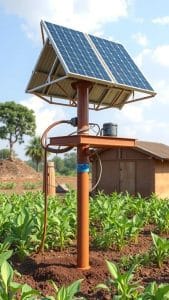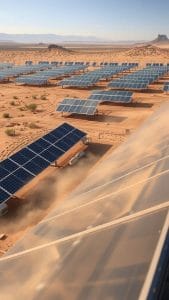Comparing Solar Water Heating and Photovoltaic Systems: Key Differences and Benefits
Understanding Solar Water Heating Systems
Solar water heating systems capture the sun’s energy to heat water directly. These systems use solar collectors, usually mounted on rooftops, that absorb sunlight and transfer that heat to a water storage tank. The heated water can then be used for showers, washing dishes, or even heating a home. Solar water heating is a straightforward way to reduce reliance on traditional gas or electric water heaters, cutting energy bills significantly.
This technology is most efficient in sunny areas and tends to perform best when there is a high demand for hot water. Since it directly harnesses solar thermal energy, it uses less electricity compared to conventional water heating methods.
How Photovoltaic Systems Work
Photovoltaic (PV) systems convert sunlight into electricity using solar panels made of semiconductor materials. When sunlight hits the panels, it generates a flow of electricity that can power your home’s appliances, lighting, and other electrical systems. In some cases, surplus electricity is sent back to the grid or stored in batteries for later use.
Inverter Not Working? Get Emergency Repair!
Don't let a broken inverter leave you without power. Our certified technicians provide same-day diagnosis.
Get Emergency Repair Now →Unlike solar water heating, photovoltaic systems produce versatile energy that can fuel a variety of devices, not just water heaters. This makes PV systems popular for homeowners aiming to cut overall electricity costs or reduce their carbon footprint.
Key Differences Between Solar Water Heating and Photovoltaic Systems
Choosing between solar water heating and photovoltaic systems depends on your household needs, budget, and local climate. Here are the crucial distinctions to consider:
- Energy Type: Solar water heating produces thermal energy for heating water, while PV systems generate electrical energy for broad use.
- System Complexity: Solar water heaters are mechanically simpler but require plumbing adjustments. PV systems involve electrical wiring and potential battery storage setups.
- Installation Costs: Initial costs for solar water heating tend to be lower compared to photovoltaic systems but vary based on system size and installation complexity.
- Energy Efficiency: Solar water heating can reach up to 70% efficiency in converting sunlight to heat, whereas PV panels typically convert around 15-20% of sunlight into electricity.
- Maintenance: Both systems need routine maintenance, but solar water heaters may require more frequent monitoring to avoid leaks or corrosion.
- Climate Suitability: Solar water heating thrives in consistently sunny areas with high hot water usage, while PV systems remain effective even in less sunny conditions.
Advantages of Solar Water Heating for Your Home
If your primary goal is to reduce the cost of heating water, solar water heating stands out. By directly using the sun’s heat, this system is highly efficient in cutting down energy needed for water heating. Over time, this can translate to substantial savings on your utility bills.
Inverter Not Working? Get Emergency Repair!
Don't let a broken inverter leave you without power. Our certified technicians provide same-day diagnosis.
Get Emergency Repair Now →You’ll also enjoy the environmental benefits of lowering your home’s carbon footprint by relying less on fossil fuels. Besides selling power back to the grid, you avoid the energy losses involved in converting electricity to heat, which commonly occurs when using electric water heaters.
Why Choose Photovoltaic Systems?
Photovoltaic solar panels offer more flexibility because the electricity they generate can power a wide range of household needs—not just water heating. If you want to move towards a more self-sufficient, green energy lifestyle, PV systems allow you to offset energy costs across lighting, electronics, HVAC, and more.
This investment also opens up opportunities to connect your home to net metering programs, where you earn credits for surplus electricity sent to the grid. Additionally, with battery storage, you can enjoy power even during outages or nighttime, which solar water heaters don’t provide since they only store heated water.
Inverter Not Working? Get Emergency Repair!
Don't let a broken inverter leave you without power. Our certified technicians provide same-day diagnosis.
Get Emergency Repair Now →Making the Right Choice for Your Home
To decide between solar water heating and photovoltaic systems, think about your household energy priorities. Ask yourself these questions:
- Is your main goal to save money on water heating specifically?
- Do you want to reduce your overall electricity consumption?
- How much roof space do you have for panels or collectors?
- What is your local climate like in terms of sun exposure?
- Do you plan to invest in battery storage or expand to more solar applications in the future?
Solar water heating is often the better choice if heating water efficiently and affordably is your priority, especially in warmer climates. Conversely, photovoltaic solar panels offer a broader solution to energy independence and are ideal if you want to reduce electricity bills or integrate with smart home systems.
Combining Both Systems for Maximum Benefit
For some homeowners, installing both solar water heating and photovoltaic panels can provide the best of both worlds. Solar water heating can lower the energy needed for hot water while PV panels cover other electrical needs, making your home as energy-efficient as possible.
Inverter Not Working? Get Emergency Repair!
Don't let a broken inverter leave you without power. Our certified technicians provide same-day diagnosis.
Get Emergency Repair Now →This hybrid approach maximizes renewable energy use from sunlight by splitting the thermal and electrical demands. It requires a higher upfront investment but can lead to greater overall savings and stronger resilience against energy price hikes.
Factors to Consider When Choosing Between Solar Water Heating and Photovoltaic Solutions
Understanding Your Energy Needs
Before deciding between solar water heating and photovoltaic systems, the first thing to evaluate is your energy consumption pattern. Solar water heating specifically targets the production of hot water by capturing solar thermal energy, making it ideal for households or businesses with consistent hot water demand. On the other hand, photovoltaic (PV) panels convert sunlight directly into electricity, supporting broader electrical needs such as lighting, appliances, and electronic devices.
If your primary goal is reducing costs related to heating water, a solar water heating system is often more efficient and cost-effective. But if you want to generate electricity to support various electrical appliances or even feed power back to the grid, photovoltaics are better suited for that purpose.
Inverter Not Working? Get Emergency Repair!
Don't let a broken inverter leave you without power. Our certified technicians provide same-day diagnosis.
Get Emergency Repair Now →Climate and Location Considerations
Both systems depend on sunlight, but how that sunlight is used varies significantly. Solar water heating systems rely on consistent and direct sunlight to efficiently warm water. These systems are typically more effective in areas with abundant sunny days and moderate climate conditions. Excessive freezing temperatures can pose challenges unless the system includes freeze protection.
Photovoltaic systems are more adaptable in diverse climates. While they perform best in direct sunlight, they can also generate electricity on cloudy days, albeit at reduced efficiency. This flexibility makes PV panels suitable in regions where sunlight might be inconsistent.
Initial Investment and Long-Term Savings
Evaluate your budget for upfront costs as well as the potential return on investment. Generally, solar water heating systems tend to have lower installation costs compared to photovoltaic arrays of comparable energy output. Because solar water heaters deliver thermal energy directly for water heating, their conversion efficiency is higher, resulting in potentially quicker payback periods.
Inverter Not Working? Get Emergency Repair!
Don't let a broken inverter leave you without power. Our certified technicians provide same-day diagnosis.
Get Emergency Repair Now →However, photovoltaic systems may require a higher initial investment, including PV panels, inverters, wiring, and potentially battery storage. Despite this cost, PV systems offer long-term benefits by providing flexible electricity generation for various needs. Incentives, rebates, and net metering policies in your area can also affect the financial viability of each option.
Space Requirements and Installation
Both systems require adequate space, usually on your roof or nearby grounds, but their spatial demands differ:
- Solar Water Heating: This system involves solar collectors and a hot water storage tank. The collectors typically occupy less surface area compared to large PV arrays, making them suitable for roofs with limited space.
- Photovoltaic Panels: PV arrays can cover a more extensive roof area depending on your electricity needs. Additionally, panel orientation and tilt angles are crucial to maximize energy capture.
Also consider structural integrity and shading obstacles. Solar water heaters have heavier equipment like storage tanks, which may require additional roof support. PV panels are lighter but sensitive to shading, which can reduce efficiency.
Inverter Not Working? Get Emergency Repair!
Don't let a broken inverter leave you without power. Our certified technicians provide same-day diagnosis.
Get Emergency Repair Now →Maintenance and Longevity
Maintenance needs vary between solar water heating and photovoltaic systems. Solar water heaters involve moving parts such as pumps and valves, requiring occasional servicing to prevent leaks and ensure smooth operation. The storage tanks may also need inspection for corrosion or scaling.
Photovoltaics, by contrast, have no moving parts, so maintenance primarily revolves around periodic cleaning of the panels and electrical system checks. PV systems generally boast longer warranties and lifespans, often exceeding 25 years with minimal efficiency loss.
Environmental Impact and Energy Efficiency
Choosing a system with strong environmental benefits aligns with reducing your carbon footprint. Solar water heaters achieve high energy efficiency by converting sunlight directly into heat, reducing reliance on fossil fuels for water heating. This can significantly cut greenhouse gas emissions from household energy use.
Inverter Not Working? Get Emergency Repair!
Don't let a broken inverter leave you without power. Our certified technicians provide same-day diagnosis.
Get Emergency Repair Now →Photovoltaic energy systems generate clean electricity, enabling you to power your entire home without burning fossil fuels. Utilizing PV systems in conjunction with energy-efficient appliances can dramatically lower overall environmental impact.
Compatibility with Existing Systems
Consider how each option will integrate with your current setup. Solar water heating systems can often be added to existing water heaters, complementing traditional heating methods by preheating water and saving energy.
Photovoltaic systems may complement or potentially replace conventional electricity sources. You can opt for grid-tied PV systems to feed surplus electricity back to the grid, or off-grid setups paired with batteries for complete energy independence.
Inverter Not Working? Get Emergency Repair!
Don't let a broken inverter leave you without power. Our certified technicians provide same-day diagnosis.
Get Emergency Repair Now →Final Practical Considerations
Examining your lifestyle and usage habits helps pinpoint the best fit:
- Do you primarily want to lower your hot water bill or your entire electricity consumption?
- Are you prepared to manage the maintenance requirements of each system?
- Is your roof orientation and space suitable for the system you desire?
- Do local incentives and regulations encourage one system over the other?
Ultimately, thoughtfully balancing these factors ensures that your solar investment pays off in energy savings and environmental benefits tailored to your unique needs.
Conclusion
Choosing between solar water heating and photovoltaic (PV) systems ultimately depends on your unique energy needs and goals. Solar water heating shines if your primary focus is on reducing your water heating bills with a straightforward, efficient system designed specifically for that purpose. It uses the sun’s energy directly to heat water, making it highly efficient and often more cost-effective for households with significant hot water demands.
Inverter Not Working? Get Emergency Repair!
Don't let a broken inverter leave you without power. Our certified technicians provide same-day diagnosis.
Get Emergency Repair Now →On the other hand, photovoltaic systems offer greater versatility. PV panels convert sunlight into electricity that can power your entire home, including lighting, appliances, and even charging electric vehicles. While PV systems typically require a larger upfront investment, they can provide more comprehensive energy savings and potential income through net metering.
When deciding which system is right for you, consider factors like your household’s energy use, budget, available roof space, and local climate. If you have ample sunny days and want to lower electricity consumption, PV might be the better choice. If your primary aim is to cut down on the energy used to heat water, and you have limited space or a tighter budget, solar water heating could be a smarter fit.
Remember, both systems contribute to lowering your carbon footprint and energy bills. Evaluating your specific energy demands and financial situation carefully will help you select the solar solution that makes the most sense, turning your home into a sustainable, energy-efficient space.
Inverter Not Working? Get Emergency Repair!
Don't let a broken inverter leave you without power. Our certified technicians provide same-day diagnosis.
Get Emergency Repair Now →Ready to discover your solar potential?
Our calculator shows you exact savings projections for your home.







